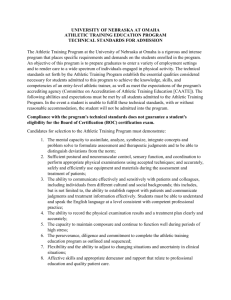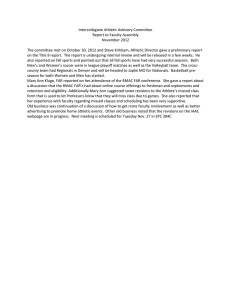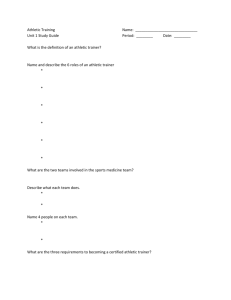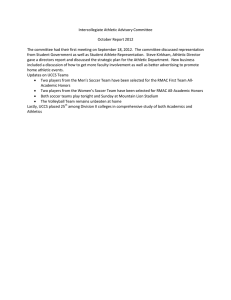program that places specific requirements and demands on the students... An objective of this program is to prepare graduates to... TECHNICAL STANDARDS FOR ADMISSION
advertisement
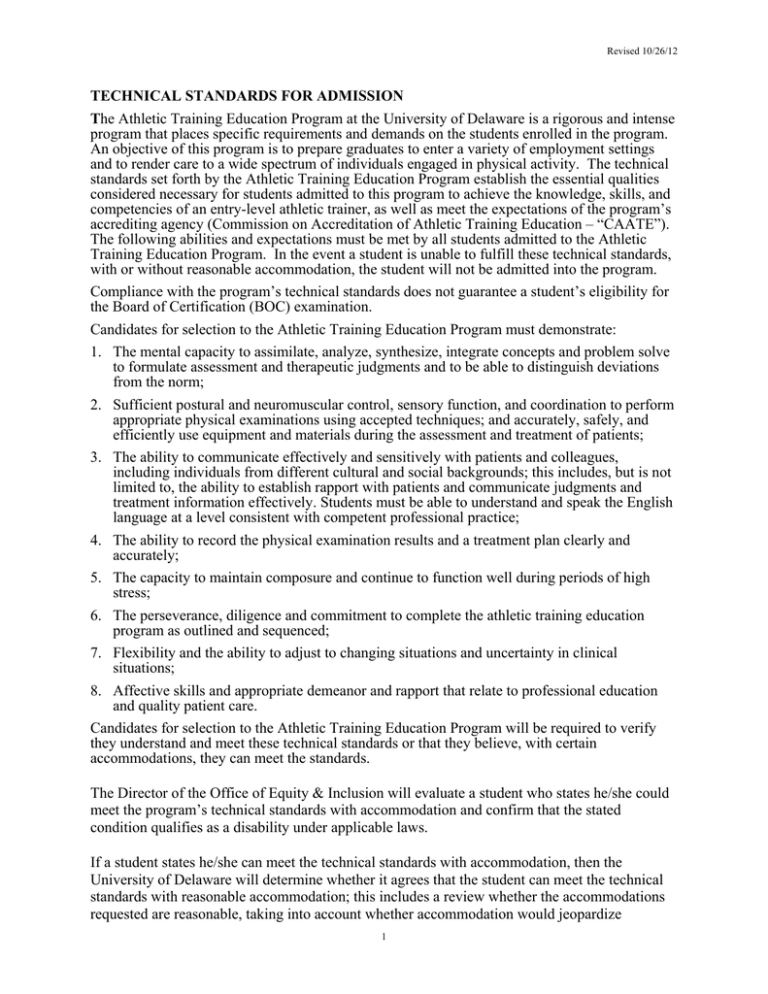
Revised 10/26/12 TECHNICAL STANDARDS FOR ADMISSION The Athletic Training Education Program at the University of Delaware is a rigorous and intense program that places specific requirements and demands on the students enrolled in the program. An objective of this program is to prepare graduates to enter a variety of employment settings and to render care to a wide spectrum of individuals engaged in physical activity. The technical standards set forth by the Athletic Training Education Program establish the essential qualities considered necessary for students admitted to this program to achieve the knowledge, skills, and competencies of an entry-level athletic trainer, as well as meet the expectations of the program’s accrediting agency (Commission on Accreditation of Athletic Training Education – “CAATE”). The following abilities and expectations must be met by all students admitted to the Athletic Training Education Program. In the event a student is unable to fulfill these technical standards, with or without reasonable accommodation, the student will not be admitted into the program. Compliance with the program’s technical standards does not guarantee a student’s eligibility for the Board of Certification (BOC) examination. Candidates for selection to the Athletic Training Education Program must demonstrate: 1. The mental capacity to assimilate, analyze, synthesize, integrate concepts and problem solve to formulate assessment and therapeutic judgments and to be able to distinguish deviations from the norm; 2. Sufficient postural and neuromuscular control, sensory function, and coordination to perform appropriate physical examinations using accepted techniques; and accurately, safely, and efficiently use equipment and materials during the assessment and treatment of patients; 3. The ability to communicate effectively and sensitively with patients and colleagues, including individuals from different cultural and social backgrounds; this includes, but is not limited to, the ability to establish rapport with patients and communicate judgments and treatment information effectively. Students must be able to understand and speak the English language at a level consistent with competent professional practice; 4. The ability to record the physical examination results and a treatment plan clearly and accurately; 5. The capacity to maintain composure and continue to function well during periods of high stress; 6. The perseverance, diligence and commitment to complete the athletic training education program as outlined and sequenced; 7. Flexibility and the ability to adjust to changing situations and uncertainty in clinical situations; 8. Affective skills and appropriate demeanor and rapport that relate to professional education and quality patient care. Candidates for selection to the Athletic Training Education Program will be required to verify they understand and meet these technical standards or that they believe, with certain accommodations, they can meet the standards. The Director of the Office of Equity & Inclusion will evaluate a student who states he/she could meet the program’s technical standards with accommodation and confirm that the stated condition qualifies as a disability under applicable laws. If a student states he/she can meet the technical standards with accommodation, then the University of Delaware will determine whether it agrees that the student can meet the technical standards with reasonable accommodation; this includes a review whether the accommodations requested are reasonable, taking into account whether accommodation would jeopardize 1 Revised 10/26/12 clinician/patient safety, or the educational process of the student or the institution, including all coursework, clinical experiences and internships deemed essential to graduation. In accordance with CAATE ‘Health and Safety” standard V athletic training students will abide by the following: A. Technical standards required for completion of the program must be clearly defined, published, approved by appropriate institutional representatives and be publically accessible. 1. Students must read and sign the technical standards and are required to update their signature if their health status changes. Students who require accommodation to meet the technical standards must obtain verification by a physician or appropriate institution disability officer as defined by sponsoring institution policy that proper accommodation has been provided for the student to meet the standard. B. Students must have documentation of immunizations appropriate for health care providers as determined by the institution. C. An active communicable or infectious disease policy as determined by the institution must be established and made publically available. D. Students must read and sign the program's active communicable disease policy as described in Standard V.C. E. Athletic training students must have liability insurance that can be documented through policy declaration pages or other legally binding documents. F. Athletic training students must have verification of completion of applicable HIPAA training as determined by the institution. G. The program must establish a uniform written safety policy for all clinical sites regarding therapeutic equipment. Sites accredited by JAHCO, AAAHC or other recognized external accrediting agencies are exempt. 1. The program must provide proof that therapeutic equipment at all sites is inspected, calibrated, and maintained according to the manufacturer’s recommendation, or by federal, state, or local ordinance. H. Blood-borne pathogen training and procedures: 1. Formal blood-borne pathogen training must occur before students are placed in a potential exposure situation. This includes placement at any clinical site, including observational experiences; 2. A detailed post-exposure plan that is consistent with the federal standard and approved by appropriate institutional personnel must be provided to the students. 2 Revised 10/26/12 3. Blood-borne pathogen policies must be posted or readily available in all locations where the possibility of exposure exists and must be immediately accessible to all current students and program personnel including preceptors; 4. Students must have access to and use of appropriate bloodborne pathogen barriers and control measures at all sites; 5. Students must have access to, and use of, proper sanitation precautions (e.g. hand washing stations) at all sites. I. All sites must have a venue-specific written Emergency Action Plan (EAP) that is based on well-established national standards or institutional offices charged with institution-wide safety (e.g. position statements, occupational/environmental safety office, police, fire and rescue). 3

